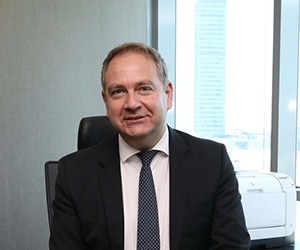Executive insights fromRudy Guillemyn, head of Elite & Private Banking at First Abu Dhabi Bank.

Global Finance: How do you see wealth evolving in the MENA region?
Rudy Guillemyn: Despite recent challenges, the past five years have seen a substantial increase in global wealth and this trend will continue. The growth of high net worth individuals in emerging markets will outpace developed markets until 2023—at 8% versus 4% per year. Asia Pacific, Latin America, MENA and Eastern Europe are the engine for growth going forward as the industry continues to face fee margin and cost pressures in developed markets.
The number of millionaires worldwide is expected to reach 27.6 million by 2023 and the region likely to experience the fastest millionaire population growth after Asia (excluding Japan) is MENA with 9.8% as yearly growth.
GF: Who are the new HNWI?
Guillemyn: Historically, private wealth in the Middle East has often been viewed as family, as opposed to individual wealth. Today, entrepreneurism has become fashionable among younger citizens, especially in Saudi Arabia. We are also seeing increasing participation and visibility of women in entrepreneurship, in the strategic management of family wealth and in growth of their own independent investment portfolios parallel to but separate from family wealth.
There is potential to capture wealth from business owners, real estate owners, professionals/ expats, and inheritors by adapting the customer value proposition for each category: Business owners—often risk-takers focused on wealth creation and access to broad investment opportunities; real estate owners—looking to diversify portfolio/hedge against regional instability and often need of instruments with high liquidity; professionals/expats—demand for transparency and control and willing to explore a variety of products; inheritors—focus on income generation and wealth preservation
GF: How do their needs differ from the previous generation?
Guillemyn: New generation of wealthy clients are slowly moving away from focusing purely on performance as the criterion for choosing their wealth manager to looking for a firm that will also make their lives easier and empower them to make their own decisions at their most convenient time. Client preferences are rapidly changing toward digital and voice-enabled assistants—not just for basic, transactional activities, but to manage wealth and receive financial advice. However, many clients value the human touch. Demand for sustainable investments is being driven, in part, by millennials who prefer to invest in alignment with personal values.
GF: How do you adapt private banking to those new customers while keeping a balance with the older generation?
Guillemyn: FAB Private Banking is working on outcome-based solutions that provide easier, faster and more personalized ways of matching products and services with real-time client demands. We are focusing on a hybrid operating model: clients have access to digital tools that facilitate self-investing, but also can tap into human advice in order to keep a balance between the different generations.
GF: How has Covid-19 changed things?
Guillemyn: The impact on financial markets has been very significant, with market volatility continuing and the economic shock to businesses expected to be sharp and large, but hopefully temporary.
On the short term, we are monitoring the coronavirus situation very closely and liaising with government and public health officials. Our priority is the wellbeing of our clients and employees. From a business perspective, the entire Elite and Private Banking teams are even more available for customers to provide financial advice, and to discuss client portfolios by reconsidering the risks and rethinking the investments objectives. All our experts across various investment products and markets are also available to guide our investors through this crisis and for the future. Despite the social distancing we have ask our teams to be even more proactive and engaged with all our customers.
On the medium and long-term we see Covid-19 as an opportunity. It forces us to break through our current operational processes to become more efficient and digitally-led. Covid-19 shows that things can change. This brings the opportunity to create innovations now that can be maintained after the crisis.



